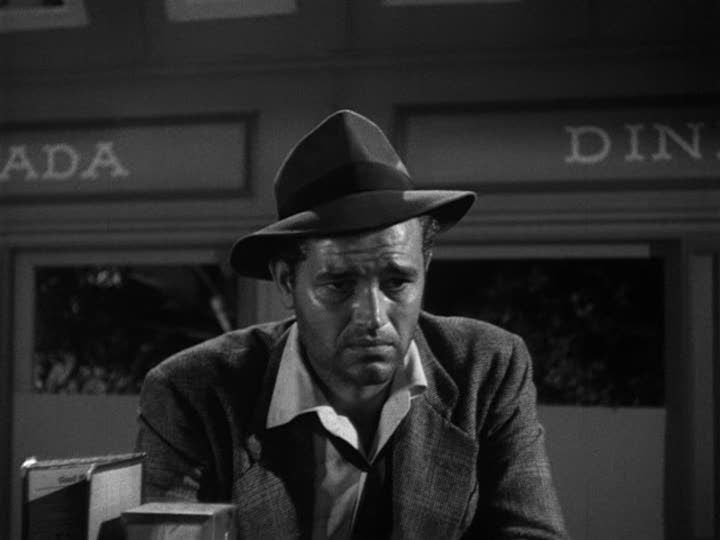
[This is a contribution to For the Love of Film (Noir), the second Film Preservation Blogathon hosted by Ferdy on Films and Self-Styled Siren. The blogathon has been organized for the benefit of the Film Noir Foundation, who do important work to restore and preserve the noir heritage. Please consider donating to the Foundation during this week. The blogathon will run from February 14-21, and during this time I'll be posting about some noirs to raise awareness of the blogathon and its worthy cause.]
Edgar G. Ulmer excelled at making tough, gritty pictures on miniscule budgets: films that transcend their Poverty Row production values with a strangely haunting grace and beauty, a powerful aesthetic guiding every rough shot of Ulmer's work. The ratty B noir Detour is perhaps Ulmer's strongest film, a pithy hour-long ode to fallen men and dangerous women — or is it the other way around? Al Roberts (Tom Neal) is just an ordinary guy, a bit down on his luck maybe, a pianist whose beloved singer girlfriend Sue (Claudia Drake) has moved to California, hoping to make it in show biz. Roberts hitchhikes after her, but his journey to be reunited with his love goes awry when, through an improbable series of circumstances, he accidentally kills a man who has picked him up on the road. Knowing that the police would never believe his outrageous story, Roberts decides to hide the body and assume the other man's identity. But even this plan is foiled when he himself picks up a female hitchhiker, the fiery Vera (Ann Savage), who recognizes the car and knows that Roberts wasn't the one who was driving it not long ago. Roberts' sad story is told through a series of flashbacks, narrated in a shattered monotone by the antihero, who relates each new twist as though he still can't believe these things happened to him. Roberts is an everyman, with no money in his pockets and no luck, and he's easily manipulated by the sinister Vera. Savage's performance is truly eviscerating; she looks at Roberts like he's prey, with her eyes wide, gritting her teeth, her eyebrows gesticulating wildly, her voice a cold hard rasp.
Ulmer's a true poet of the noir: his images have an unsettling potency and startling emotional depths. Even Vera, the wanton woman, has her moment of warmth, when she places a hand seductively on Roberts' shoulder and tells him, her words freighted with meaning, "I'm going to bed." She looks at him expectantly, and when he shakes off her implicit offer, her face hardens into her usual eagle-like mask, putting up a front of rage to disguise her disappointment and hurt. Ulmer's ragged poetry can also be found in the half-awake dream Roberts has while driving, a vision of Sue singing against a backdrop of shadowy jazz musicians — a surreal interlude that juxtaposes Sue's cheery, all-American sweetness against the dark, tawdry circumstances into which the dazed Roberts stumbles. Ulmer's images have a hazy, raw quality that is both hyper-real and disturbingly unreal, a nightmare imagining of a world determined to punish the innocent, to corrupt them, to make them guilty. But his vision is also sufficiently open-ended that it allows for another interpretation, in which the entire film is the delirious self-justification of a guilty man, spinning wild stories to assuage his conscience. Either way, Detour is a harrowing and unforgettable noir, a distillation of the genre's essential themes and images into their most untempered form.
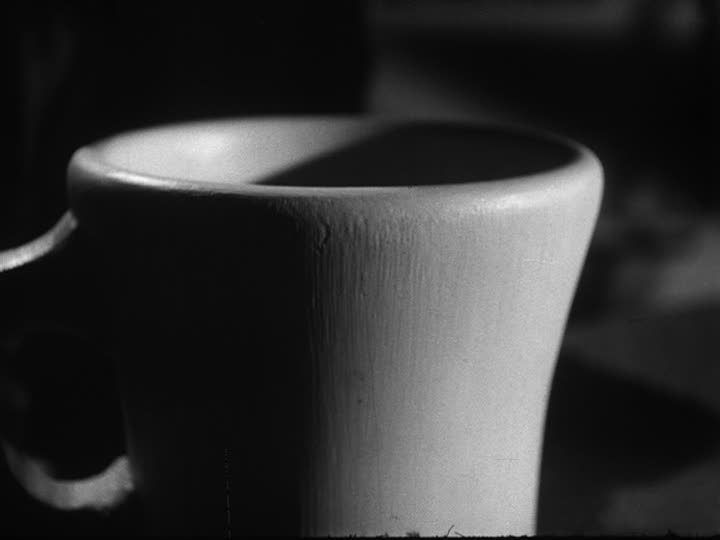
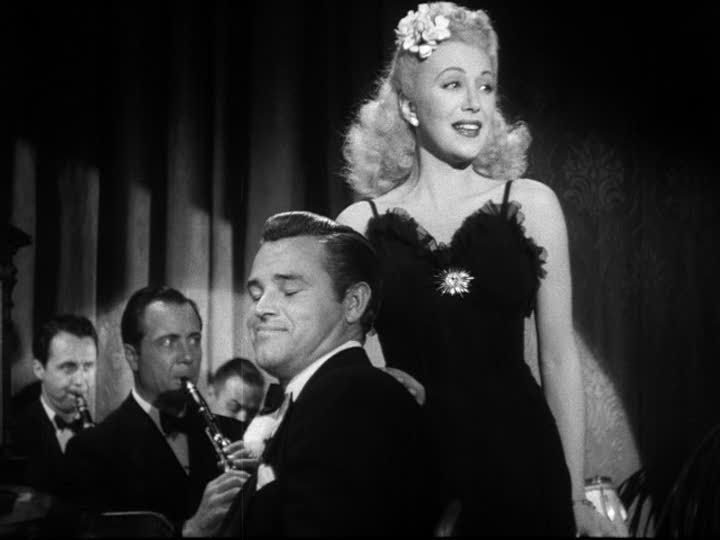
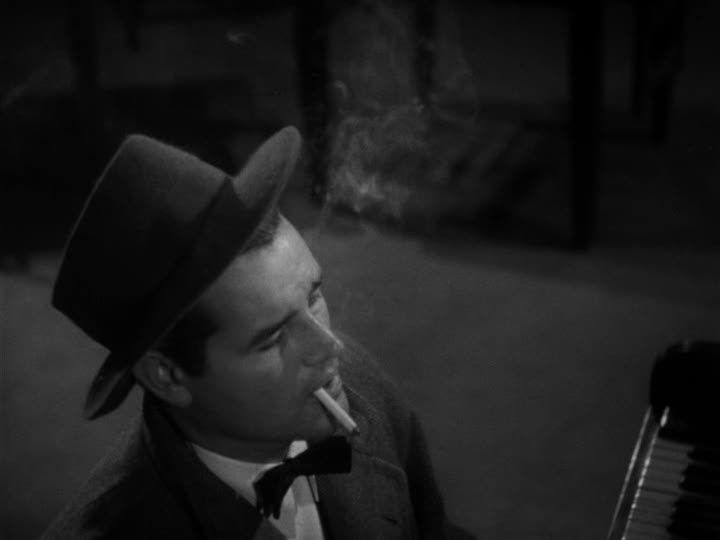
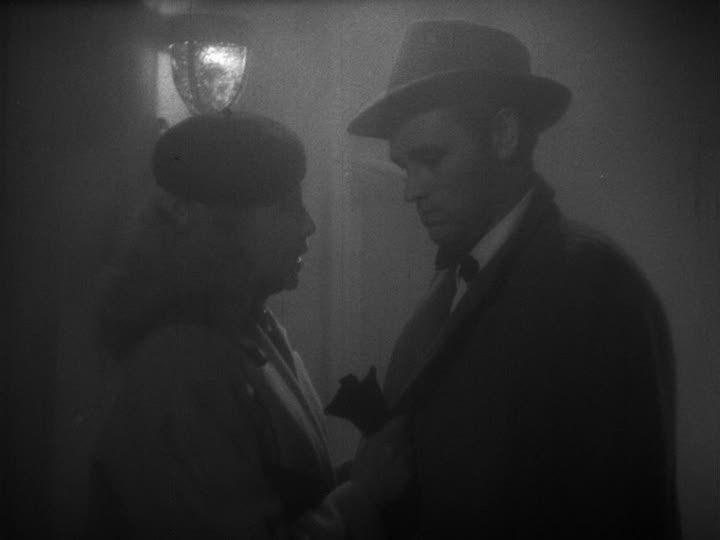
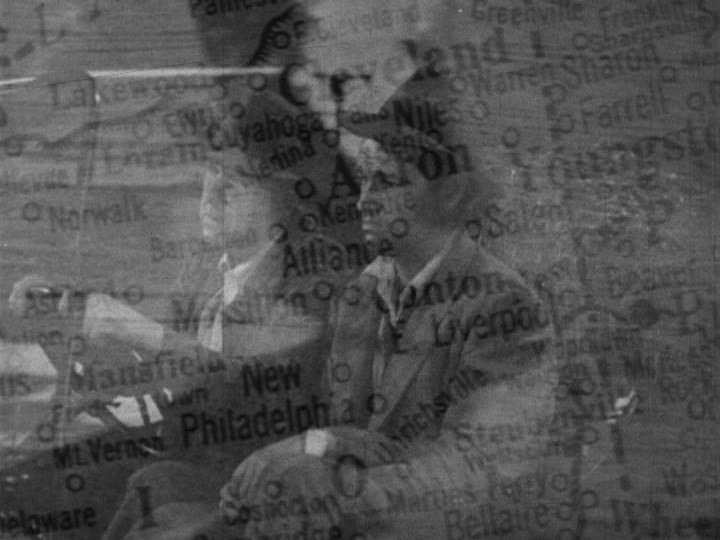
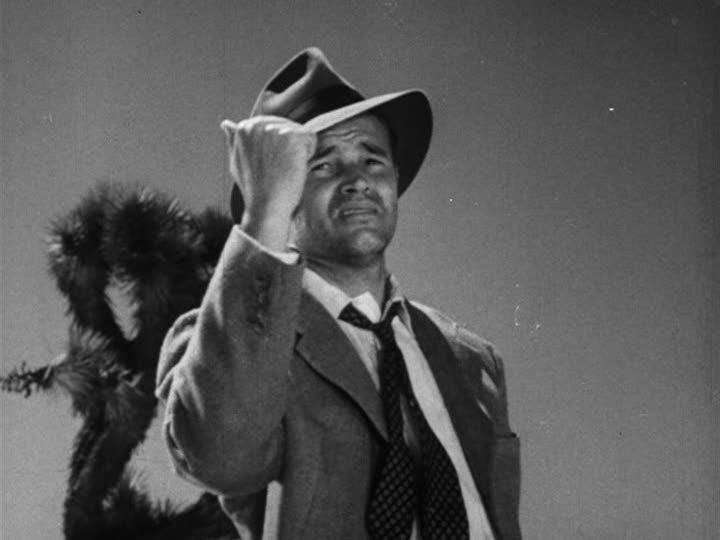
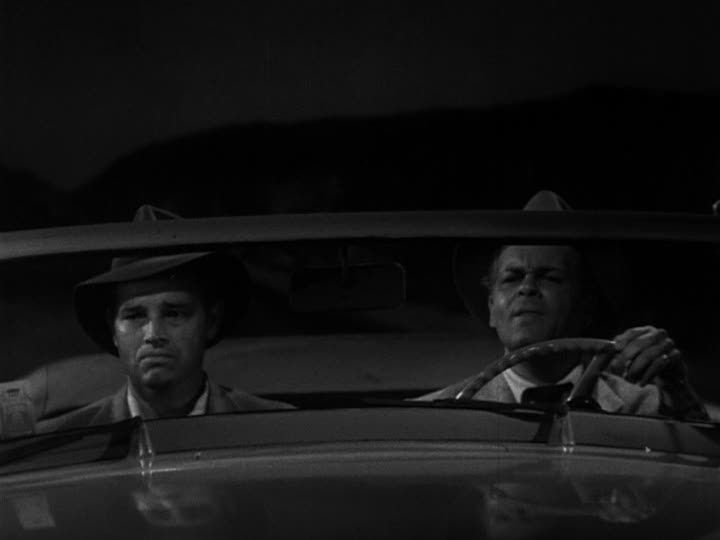
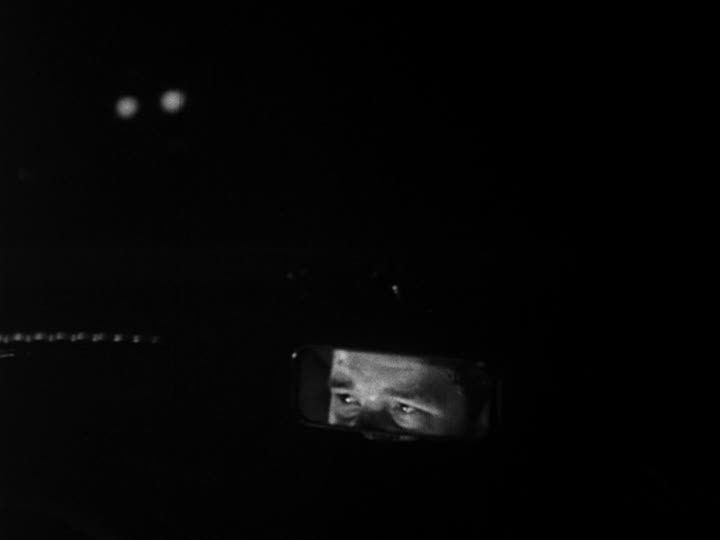
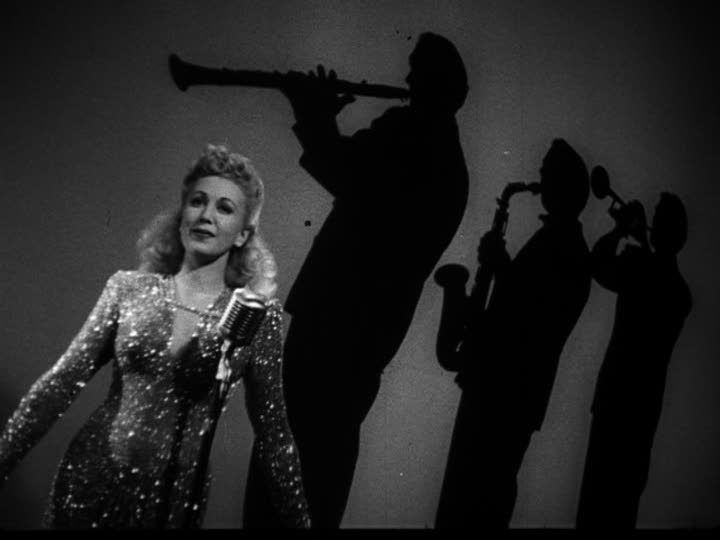
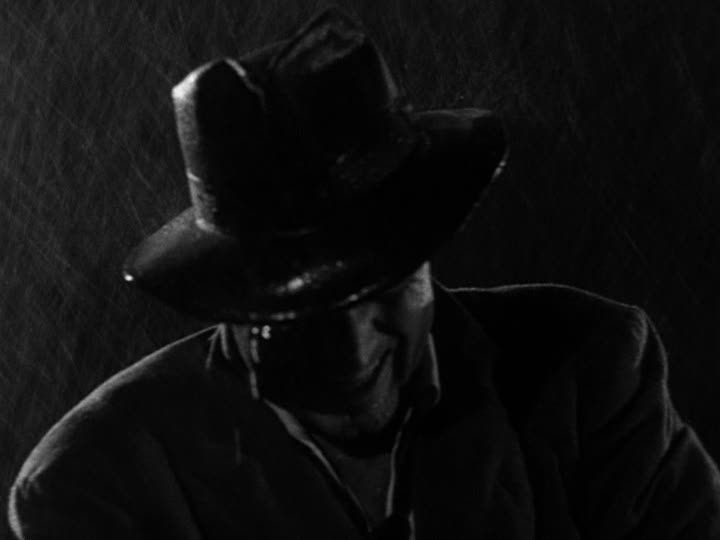
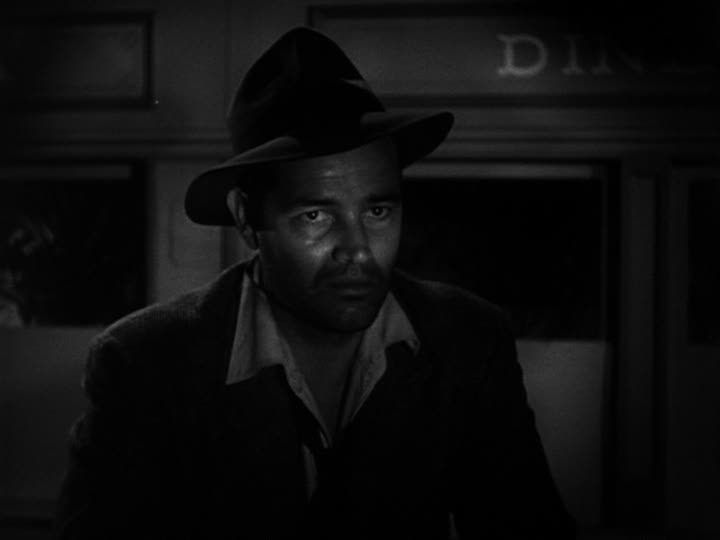

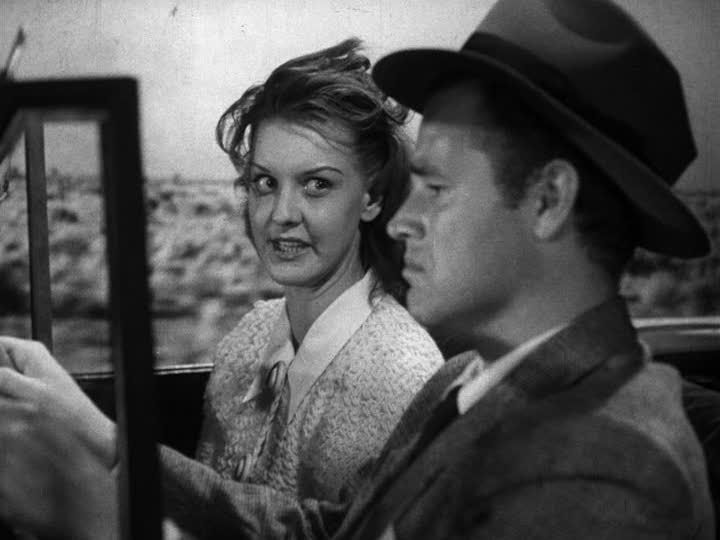
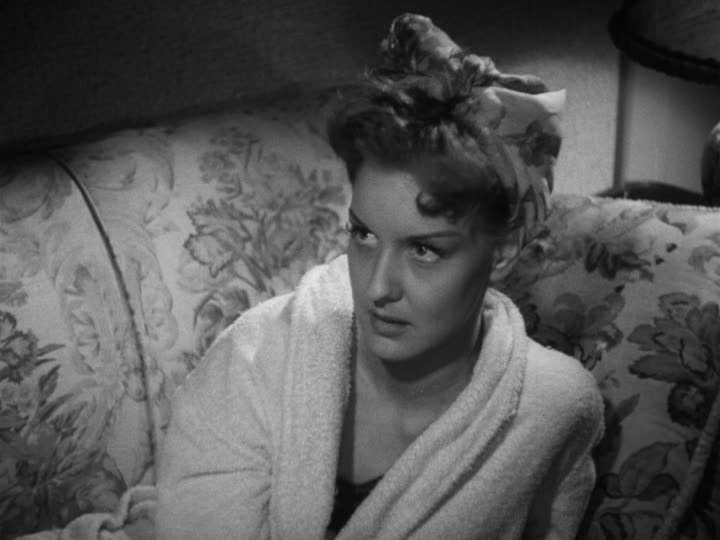

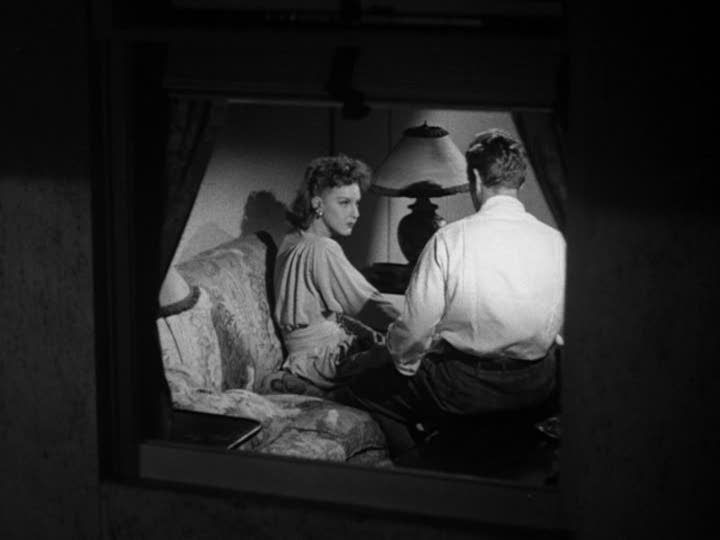
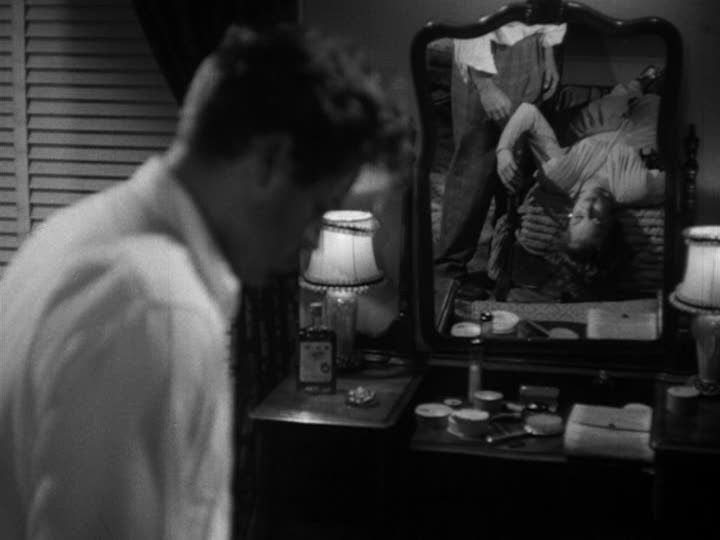

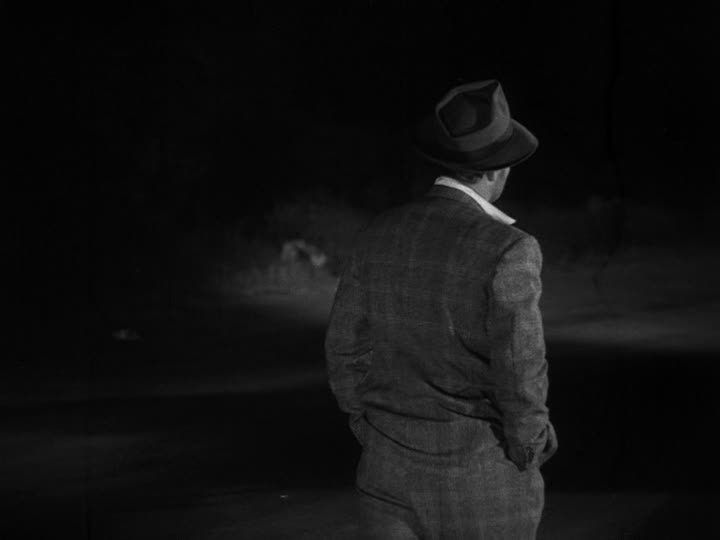

16 comments:
That coffee cup deserves co-star billing.
So nice that Guy Maddin was able to give Ann Savage a last hurrah in My Winnipeg (2007)
Those are some great screencaps.
Hah! The coffee cup and the liquor bottle. Two staples of noir drinking.
Thanks, Scott!
"Ulmer's a true poet of the noir: his images have an unsettling potency and startling emotional depths."
I personally think it was an excellent idea to go with the "Films That I Love" capsule here as it allowed for a extravagently appropropriate screen cap display that made the case for the film especially persuasive, but it also provided the "capper" on a discussion of the film that has been ongoing at other sites. Purportedly scorned by other filmmakers for his transcription of noir sensibilities within severe B grade constrictions, Ulmer had the right sensibilities for this material, which we have seen in films like "The Black Cat" and "Bluebeard" especially. The 'haunting grace and beauty' you suggest hear validate your all-encompassing quote above, and this is indeed the 'aesthetic' that this acknowledged cult director imparted to his personal works.
Again, you've nailed it with fecund accuracy.
Awesome screen caps Ed. The unreliable narrator angle is the most rewarding way to watch the film. It does give the proceedings additional seediness and darkness. I'm slowly buying into this belief. Great piece.....M.Roca
Detour sure is the flavour of the season. Within a span of less than I week this movie has been covered by Maurizio Roca, John Greco & you!
Despite the shoddy production values, the fatalism in the film was really something! And its that dose of fatalism (which is even poetic at times) that made this movie stay in my mind even though, all things considered, this is a flawed film it best.
Great write-up Ed. And the collection of images from the film that you've posted sure is the clincher.
Fantastic film and writeup.
// Savage's performance is truly eviscerating; she looks at Roberts like he's prey, with her eyes wide, gritting her teeth, her eyebrows gesticulating wildly, her voice a cold hard rasp. //
YES. Incredible performance, unforgettable.
Sam, thanks for the kind words. I think you're right: seeing all these images from Detour confirms the roughshod poetry of the film far better than any of my verbiage could.
Maurizio, yeah, that's the way I've always thought about the film, though it's left open enough that it can be read multiple ways. I'm glad your review prompted so much discussion of this film.
Shubhajit, while I don't quite agree that the film is flawed (technically rough, but I don't see that as a flaw since it works so well) I agree that it's the bleak fatalism of the narrative that makes the film really great.
Sheila, I know you love those femme fatales. So do I, and Ann Savage in this film is one of the best.
Love this movie and love how you write about it!
Detour is everything a noir should be and it pains me it's not more well-known as a canonical, exemplar film noir. I wish this was taught in classes more often than the standard Maltese Falcon/Double Indemnity combo.
Thanks, Kristen. I agree, it's really a prime example of what the noir is all about.
I've always thought of it as canonical. Not only in terms of noir but how to make an effective film with a budget of $1.25
I don't really have a ton to add to your great write-up here, Ed, and as has been noted there's already been a few really good pieces and ensuing discussions in the past week, which I've also enjoyed reading.
This is quite simply one of my top 2-3 noirs of all time. It's so perfectly desperate, so bleak, so poetic in its rough-hewn aesthetics. It's one of those I feel would be perfect for frame-by-frame analysis as Ulmer packs so much style, suggestion and interpretive room into most every frame, all the more staggering considering the limited time & means he was working with. It also opened the door to Ulmer for me, for whom I also share in your admiration Ed, and aside from the aforementioned BLUEBEARD and THE BLACK CAT, I'd highly recommend STRANGE ILLUSION and TOMORROW WE LIVE, which I reviewed last year.
I have a terrible, crappy quality DVD of DETOUR that I absolutely treasure, as the grime and garble add so much to the viewing. This is one of the only movies I can think of that the idea of it getting some high-end, digitally restored release would do absolutely nothing for me.
I got the Noah Isenberg BFI book as a Christmas gift, and it comes highly recommended for anyone who loves the movie.
David--
I think Detour has become part of the common in more recent years, but at least when I was studying, there was a certain division between "A" noirs like Double Indemnity and "B" noirs like Detour. To me, this ranking should be switched because the low-grade, low-budget, gritty & nasty movies like this far outweigh films with A-list talent or a well-regarded director like Wilder, Preminger, Hitchcock, Welles, etc. IMDb is a particularly unreliable barometer, but Detour isn't even listed among its top 50 films noir. The top 10 in that list reveal a preoccupation with auteurism rather than an appreciation for low-budget fatalism.
Like I've said, Double Indemnity is usually showcased as the prototypical noir, when I believe Detour far outpaces it in terms of essential "noir-ness."
Drew, I'm with you on the grime only adding to the film's appeal; it's supposed to be grimy, not glossy at all. And at the same time you're also right that the film could stand up to frame-by-frame analysis. When every shot, every moment, seems so packed with energy and off-kilter beauty, it's hard to deny that Ulmer was barely constrained by his shoestring budgets and cheap surroundings. I love Ulmer in general, but still need to get to the films you mention, which I have in a nice box set of his work. Soon!
Kristen, I'm totally with you on the A versus B noirs. Double Indemnity is a fine film, but it's way too polished to be the quintessential noir. Detour is probably too raw, too ugly, to ever be as broadly popular, but as David says, it is, and should remain, in the canon as both a great work in itself and a perfect example of how much you can do with a couple of bucks and some film stock.
"ragged poetry" -a perfect phrase to describe Ulmer's great film. On the surface it should not work but with the touch of a poet it became a lesson in low budget filmmaking and artistry.
Thanks, John! Totally agreed.
Post a Comment